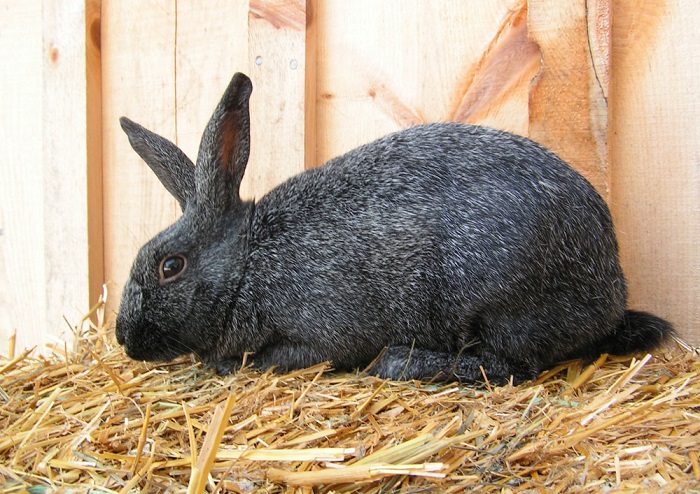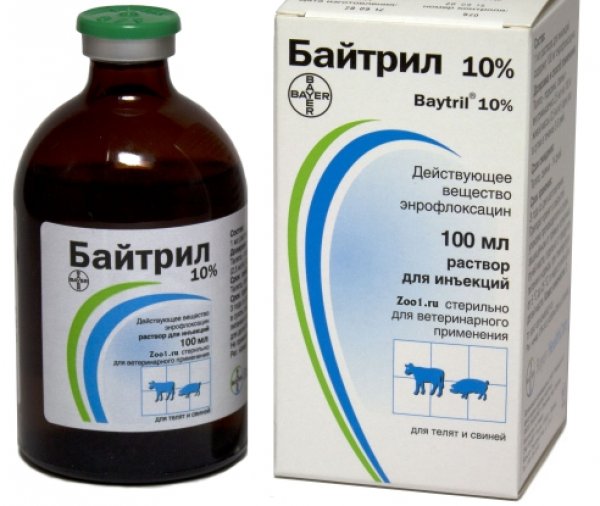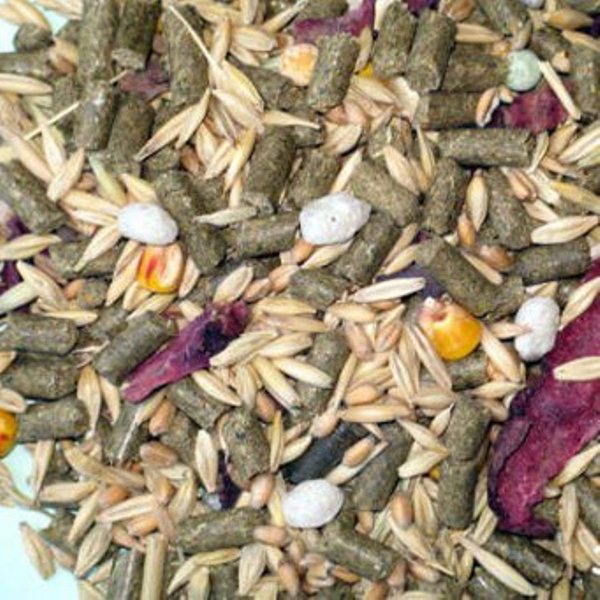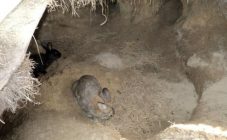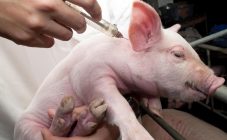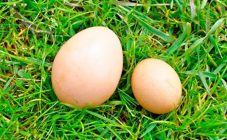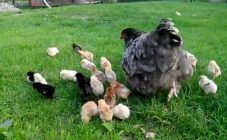Content:
Novice breeders can get confused if signs of digestive upset in animals appear. Delayed treatment can kill the animal. And the topic of the article is diarrhea in rabbits, the cause and treatment.
Causes of diarrhea in rabbits
It is believed that diarrhea is common in herbivores. Indeed, animals have a delicate digestive system that often reacts in a similar way to the introduction of new foods. However, diarrhea is very dangerous for pets, if delayed with treatment, the animal can die.
- Errors in the composition of the diet. Feeding foods high in sugar such as bread, biscuits and fruits. Also, an excess of succulent feed and a lack of hay lead to indigestion.
- Obesity. Excess weight makes it difficult to lick your rabbit. The animal cannot reach the anus for the procedure.
- Diseases of the joints also make it difficult to keep the pet clean, the feces are smeared over the fur, and then enters the body.
- Poor quality products. Wet vegetables, spoiled food containing mold can lead to the death of the animal.
- Lack of a clear diet.
- Stress. Rabbits are very sensitive to changes in environment and diet. Changing owners can also cause diarrhea.
- Worms.
- Incorrect tooth growth.
- Malfunction of the genitourinary system.
- Violation of sanitary standards and untimely cleaning of the cage. Dried or sour food pieces can cause digestive upset.
- Ingestion of harmful plants.
- Enteritis.
- Coccidosis.
- Viral or bacterial infection.
- Allergy to drugs.
Experts do not recommend purchasing decorative rabbits younger than 8 weeks old, since before this period diarrhea is a frequent occurrence in young animals.
What should be normal stool
Most often, ornamental animals kept at home are vilified. During diarrhea, they lose their ability to control themselves and begin to defecate outside the latrine. This often happens involuntarily during sleep. The classic form of feces is in the form of peas or grapes. During diarrhea, the stool is soft or watery. It is important to pay attention not only to the consistency of the stool, but also to its color. An unusual shade, mucus, and a strong pungent odor may indicate a medical condition.
The rabbits have brought in: what to do
If rabbits vilify, you need to take action right away. It is important not only to correctly identify the cause of the diarrhea, but also to protect other pets from this disorder. The stool must be examined carefully first, so it is important to learn to distinguish between soft night stools and diarrhea. After there is no doubt about the digestive upset, the following actions should be taken:
- take out everything unnecessary from the cage, leaving only bedding and water;
- wash the pet's ass and dry it;
- carry out the processing and disinfection of the animal cell;
- spread a clean cotton cloth or disposable napkins;
- give the animal a decoction of herbs or a drug for diarrhea;
- monitor body temperature, with diarrhea, the animal may freeze;
- put a heating pad or turn on a heating light;
- water the rabbit to keep it hydrated.
The veterinary first-aid kit of the owner of the decorative rabbit should contain: gloves, a heating pad, saline solution, a syringe, a pharmacy collection of chamomile, Potentilla, oak bark, activated carbon, disposable diapers.
Diarrhea in rabbits: how to treat
They have shown themselves well in the treatment of herbivores folk remedies. Experts recommend giving them if the animal begins to vilify due to improper nutrition or stress.
- Potentilla decoction: 1 tbsp. a spoonful of dry herb is brewed in 250 ml of boiling water. As soon as the composition has cooled down, 1 teaspoon is poured into the animal's mouth using a syringe, from which the needle is previously removed.
- Chamomile decoction. The color of the drink should be light yellow. With bloating and diarrhea, the broth is given 1 tbsp. spoon 3 times a day. The course of treatment is 10 days.
- Activated carbon: 1/4 tablets are diluted in 5 tbsp. spoons of boiled water. Then the rabbit is sealed with chamomile decoction. Tablets are used as a last resort.
- A decoction of oak bark can be added to fresh drinking water to prevent dehydration of the pet.
- Mint tea.
Effective veterinary drugs:
- Baytril: 0.2 ml is diluted in 1 ml of saline and injected into the withers. The dose is calculated for an individual weighing 2 kg. Injections should be given 3 times a day.
- Linex: 0.5 capsules are given 2 times a day.
Rabbits vilify and die, what should I do? It is important to determine the cause of the diarrhea, perhaps the pets have caught the infection.
- With coccidiosis, the pet has a tousled coat, bloating, and the eyelids turn yellow. Sulfadimethoxine or norsulfazole is prescribed, 0.2 g per 1 kg of the pet's weight.
- Infectious stomatitis is characterized by the appearance of ulcers on the tongue and profuse salivation. The disease can be cured with copper sulfate: the entire oral cavity is treated with a 2% solution.
- During the transfer of paratyphoid, the animal loses its appetite, becomes lethargic, and its coat is disheveled. The pet is given furazolid: 30 mg per 1 kg of body weight in a weekly course.
- For severe bloating, experts recommend espumisan: 1 ml per 7 kg of pet's weight.
Special diet for rabbits with diarrhea
Loose stools in a rabbit is the basis for a special diet. The owner must provide the pet with quality fresh hay and ensure that the pet always has access to clean water. You can add anthelmintic drugs to the drinker. Juicy feed, fatty and protein foods, bread, flour, foods with a low fiber content are excluded from the diet. The diet should be dominated by oats and feed, rich in nutrients. It is also worth abandoning the use of store-bought chemical feeds, since food during this period should be as close as possible to nutrition in natural conditions. Experts recommend giving pets astringent herbs: yarrow, bitter wormwood and burdock.
If the animal refuses to drink, the chances are high that it will die from dehydration. In this case, you need to water the pet by force from a disposable syringe. You can also give an injection of saline or ringer's solution: 10-12 ml per 1 kg of body weight. Injections are done 2-4 times a day.
In case of refusal to eat, the herbivore is injected with 5% glucose with saline in a 1: 1 ratio.
Prevention of diarrhea
After suffering the disease, the stomach of rabbits is very weak.To protect your pet from a recurrence of diarrhea, preventive measures are needed:
- carry out therapy against worms;
- to normalize the intestinal microflora give baikoks (1 teaspoon is diluted in 1 liter of water). The solution is given instead of drinking water, the drink must be changed every 48 hours;
- reduce or eliminate grains and fruits from the diet;
- monitor the quality of hay, herbs and other products;
- add new products in small quantities;
- clean the rabbit cage regularly and change the water;
- vaccinate animals against diseases;
- protect your pet from stressful situations.
Experienced breeders know that preventing diarrhea is much better than treating it. Therefore, it is important not to neglect preventive measures, sanitary standards, regularly change the water and clean the cage. Also, nutrition plays a special role in the health of herbivores. Rabbits can die due to poor quality food. An excess of succulent or sugar-containing feed often leads to indigestion. If the animal is sick, you need to determine why this is happening and immediately begin treatment. After the problem is eliminated, the animal is transferred to a special gentle diet. The health and life of a rabbit depends on how the owner will take care of it.
